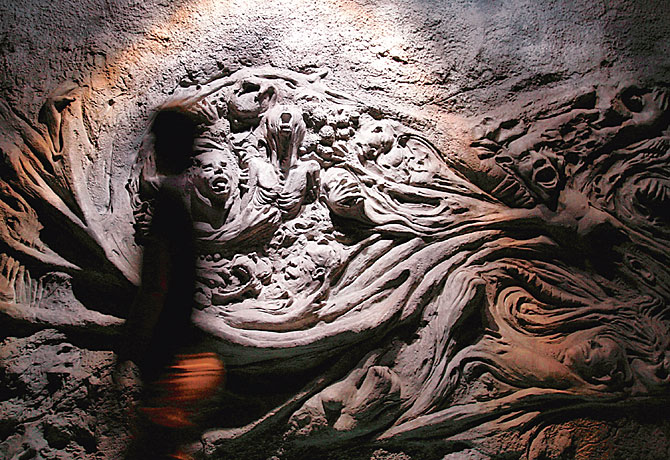
DRUG HELL: Stark bas-reliefs at the Golden Triangle's Hall of Opium museum on the Mekong dramatize the diabolical effects of substance abuse
At that point on the Mekong River where the borders of Thailand, Laos and Burma collide in scrubby riverbanks stands the Hall of Opium. It was built by the Mae Fah Luang Foundation, an initiative by Thailand's late Princess Mother to take the gangster-ridden Golden Triangle by the scruff of the neck. This indomitable little woman built a palace in the heart of lawlessness, cleared opium poppies from the land and spread schemes of agriculture around the lush countryside. Her museum is an interactive exhibition of nearly 60,000 sq. ft. (5,500 sq m), dramatizing the torrid history of opium and set in baking fields outside the exceedingly small, one-street tourist town of Baan Sor Ruak.
There will be days when the Hall echoes to the shuffles and coughs of tourist groups or rings to the disorderly delight of schoolchildren drilled off buses, but on an average morning during the week, and for the very reasonable price of $9, you can find yourself in sole possession of the entire exhibition. After preliminary contact with the staff who switch the lights and displays on for you, you can wander through its exhibits without meeting another living soul.
Huge and rather garish tableaux come alive in sequences choreographed with commentary. Slide shows take place in squares beneath your feet. Entire ships and opium dens are mocked up in rooms the height of small cathedrals. In the "Crime and Punishment" section, you walk over a dungeon, with audio wailing and clanking, laid out under the glass floor beneath you. Although it is not clear what it is—a Thai prison or a warlord's hideout—the inference is that drugs will land you in the most dreadful spots.
As the story goes through the halls, the British and their imperial trade system come in, as usual, for a lot of stick. Given the part played by tea in the opium trade (the British love of Chinese tea spurred them to produce opium as a product that would be equally desirable to the Chinese and thus balance trade), the exhibition shoots off on a tangent to a refined display of tea sets and tea-drinking accessories, set up alongside a superb collection of opium pipes. There are pipes in ivory and pipes for ladies. There are ornate accessories—scorers, scrapers, dampers—and Burmese weights in the shapes of tiny animals. Opium could be couth?
Not on your life. Set in a recess is a short video of Thai street children, addicted, abandoned and then dead (this to a soundtrack of Louis Armstrong singing What a Wonderful World). You press another button for a film contrasting a decent suburban English girl called Charlotte—turned on to heroin by her boyfriend and found bloated and dead in a bedsit—and Chartchai, a Thai addict pulled back from the sinkhole by the foundation's rehabilitation program.
At the very end is the Hall of Reflection—a high, sunny room that would do well for lunchtime concerts. But in it, carved on pillars, are framed quotations to think about. This was from the Talmud: "What is hateful to you, do not to your fellow men. That is the entire law; all the rest is commentary." It's a sentiment that still has ground to cover in the drug trade.